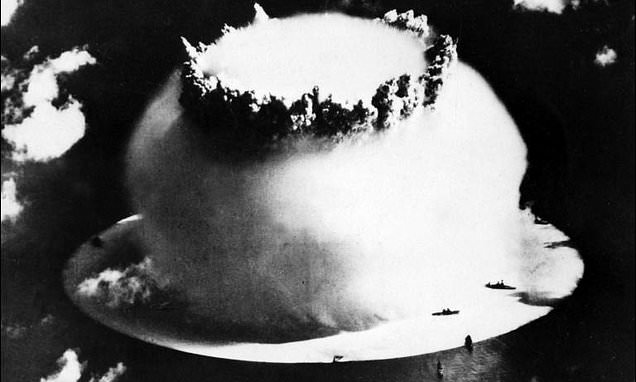Marshall Islands President Demands UN Apology for Role in Nuclear Tests
A file photo from July 1946 shows the mushroom cloud following nuclear testing on Bikini Atoll in the Marshall Islands. President Hilda Heine of the Marshall Islands has called for an apology from the United Nations for its indirect involvement in nuclear tests on the territory in the wake of World War II.
The United States detonated 67 nuclear bombs on the Marshall Islands between 1946 and 1958, and the health and environmental impacts are still felt today in the Pacific Ocean nation, which is home to 42,000 people.
At the time of some of the tests, Washington was the UN’s administering authority for the Marshall Islands. Heine accused the UN of “the only time in which any UN organ has ever explicitly authorized the detonation of nuclear weapons.”
“We can’t undo the past. But as a United Nations, we owe it to ourselves to make amends through the adoption of a resolution which formally apologizes for the failure to heed the petition of the Marshallese people,” she said in a speech to the UN on Wednesday.
Residents of the chain of islands and atolls had petitioned against the UN Trusteeship Resolutions that led to the territories falling under US control.
The US State Department says that in 1947, the UN assigned the United States “administering authority over the Trust Territory of the Pacific Islands,” which included the Marshall Islands.
Washington says it has given more than $1 billion at current rates “to the affected communities.”
‘Deep scars’
Heine said the tests had left an “ongoing legacy of death, illness, and contamination. The impacts are handed down, generation to generation.”
Thousands of Marshall Islanders were engulfed in a radioactive fallout cloud following the 1954 Castle Bravo nuclear test by the US military, and many subsequently experienced health problems.
Heine said on Thursday that the exposure was the “equivalent of 1.6 Hiroshima shots, every day, for 12 years.”
Residents of the chain of islands and atolls had petitioned against the UN Trusteeship Resolutions that led to the territories falling under US sway.
Tons of contaminated debris from the testing was dumped in a crater on the Enewetak Atoll and capped with concrete that has since cracked, sparking health concerns.
Hundreds of islanders from the Marshalls’ Bikini, Enewetak, Rongelap, and Utrik atolls have also had to relocate due to nuclear contamination. Many are still unable to return home.
“Testing impacts left behind deep scars, with communities remaining in exile from their home islands, billions of dollars in unmet adjudicated claims, and a social and environmental burden upon our youngest and future generations,” she said from the General Assembly rostrum.
“We did not choose this nuclear fate — it was chosen for us.”
A study issued by the US National Cancer Institute in 2004 estimated around 530 cancer cases had been caused by the nuclear testing.

